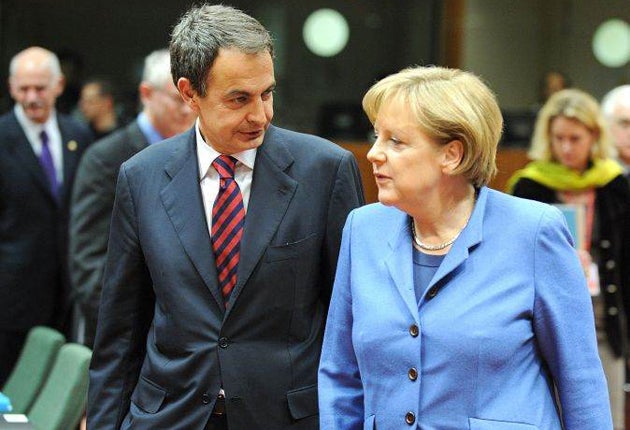Merkel hardball tactics pay off in Greece aid deal

A multi-billion-pound deal to rescue the crisis-hit Greek economy was finally agreed last night after France and Germany resolved a bitter dispute over how to ease the worst crisis to hit the euro since its launch.
The package, which could be worth as much as €25bn (£22.4bn), will crucially see Greece sent to seek "substantial" aid from the International Monetary Fund (IMF), an outcome that will be viewed across Europe as a decisive victory for Angela Merkel in a show of strength with the French President, Nicolas Sarkozy.
However, in a move that is bound to worry many EU member-states, a one-page draft version of the agreement also contained ambitious plans to turn the European Council, headed by its newly appointed President, Herman van Rompuy, into the "economic Government of the European Union".
The change would allow "strong coordination of economic policies in Europe", ultimately handing larger nations the power to shape the economic decisions of their poorer partners. British officials were playing down any concerns about the UK's sovereign powers last night. "We have been calling for greater oversight powers for the council," one said. "We are not unduly worried."
For weeks, Ms Merkel had seemed to be a lone voice in refusing to give in to pleas from across Europe that Greece should not be made to seek IMF help. The issue had caused a major rift with Mr Sarkozy, who had led calls for the 16 nations using the euro to be seen to be keeping their own house in order.
But the pair resolved their issues in talks held ahead of an EU leaders' summit in Brussels. The Franco-German deal would also include bilateral agreements between Greece and eurozone countries, which would make up the majority of the aid. British diplomatic sources ruled out any help coming from Britain. "A deal for us to get involved has not been discussed and is not on the table," the source said. The final version of the agreement may see it technically fall under European control as a concession to those nervous about sending Greece to the IMF.
Ms Merkel was under intense pressure domestically not to give in and allow anything that looked like a European bailout for Greece, a move that is vehemently opposed by most Germans. She had warned before heading to Brussels yesterday that she would not do any deal without the involvement of the IMF. "The German government will press for emergency aid combining IMF and joint bilateral aid from the eurozone but I say again, only as a last resort," she told the German parliament.
Germany negotiated hard for a "no bailout" clause when it agreed to join the eurozone. There were fears that an apparent breach of the clause could leave to a challenge in the constitutional court. State elections are also looming for the Chancellor, with her centre-right coalition facing defeat, meaning that she could lose her majority in Germany's second chamber. German officials had spent a week briefing that the Chancellor was unconcerned about domestic issues and was instead seeking to secure "the long term stability of the euro", and anything approaching a bailout would send out the wrong signals. Portugal is seen as the next chronic case. The country's credit worthiness was downgraded by one rating agency this week.
While she had appeared isolated in refusing to budge on sending Greece to the IMF, Ms Merkel had attracted allies as the summit approached. The Netherlands and Austria in the past days lent their support to the German solution. The Dutch Prime Minister, Jan Peter Balkenende, echoed Berlin in reiterating that Greece had caused its own mess and that it was now "its own responsibility to solve its problems with drastic savings. The Irish government also had massive deficits which it has tackled by slashing civil sector pay". He insisted that any bilateral eurozone loans who come only "in tandem with IMF support".
Bizarrely, the Greek crisis did not feature on the official agenda for the summit, despite being the only topic of conversation as the European delegations rolled into Brussels yesterday. "It's been incredibly damaging for the EU as a whole to have had this issue unresolved ahead of big EU summits," said a senior EU official.
"The German Chancellor is very determined that this must never happen again. She wants some agreement in return for the heavy political price she may have to pay [for coming to the Greek rescue].
"The Germans feel very aggrieved that the rules they pushed for when the euro was created were not respected."
Subscribe to Independent Premium to bookmark this article
Want to bookmark your favourite articles and stories to read or reference later? Start your Independent Premium subscription today.

Join our commenting forum
Join thought-provoking conversations, follow other Independent readers and see their replies